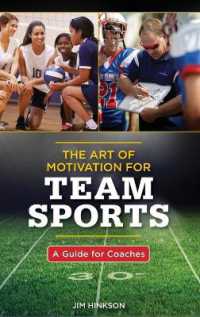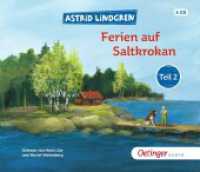- ホーム
- > 洋書
- > 英文書
- > History / World
Full Description
Archaeology is all about how the present came into existence. Thus, it contributes to the social understanding of crises, including present and potential future adversities. Even diseases, such as pandemics in past societies, were and are observed by archaeology. Some examples can be found in this booklet. The scientists of the Kiel Cluster of Excellence ROOTS describe human reactions in past societies that were organized quite differently from ours. This is precisely why it is possible to identify the basic features of human behaviour for the management of crises.
From the emergence of agriculture more than 10,000 years ago to the Russian colonisation of Siberia a few hundred years ago, a fundamental pattern is becoming apparent: crises, including those caused by disease, can only be managed by increasing diversity. Acceptance of diversity, the introduction of new technologies and socially responsible action have always led to the mastering of crises.
It is also clear that values can only be preserved or updated in crises through active involvement. For example, scientists describe that when people are passive, other social groups can easily bind power to themselves, whereas when people actively participate, more democratic structures can develop even in crisis scenarios.
This is the message that we take with us from the past: whether as a forager or as a simple farmer in earliest agricultural societies, in ancient Greece or in an early modern society - diversity and social commitment are the components that help us to overcome crises. Learning from the past for the present - that is the task of international archaeology.
Contents
Preface
Introduction. Pandemics, Crises and Solutions: The Past in the Future
Lutz Käppel, Cheryl Makarewicz, and Johannes Müller
The Roots of Zoonoses
Cheryl Makarewicz
Epidemics, Mobility and Permafrost: Lessons from Siberia
Henny Piezonka
Social Diversity and the Sharing of Knowledge in European Prehistory: Lessons for the Pandemic Present?
Martin Furholt
Why Solidarity Is Needed: Neolithic Connectivity and the Chance of Epidemics
Tim Kerig
Population Agglomeration and the "Bubonic Plague": The Earliest European Cities around 3800 BCE
Johannes Müller
Upheaval against Social Order. A Solution? Lessons from Neolithic and Iron Age Europe
Johannes Müller
Pandemia and Holism: What Ancient Medicine Had to Say
Chiara Thumiger
The Epidemic as a Challenge: Homer, Iliad
Lutz Käppel
The Epidemic as a Challenge: Sophocles, Oedipus Rex
Lutz Käppel
Oedipus and the Attic Plague
Lutz Käppel
Tracing Past Pandemics through the Analysis of Ancient Pathogen Genomes
Ben Krause-Kyora and Almut Nebel
The Medieval Leprosy Pandemic and Its Impact on the Human Gene Pool
Ben Krause-Kyora and Almut Nebel
Politics of the Pandemic
Vesa Arponen
Consequences: Diversity and Personal Responsibility
Lutz Käppel, Cheryl Makarewicz, and Johannes Müller







